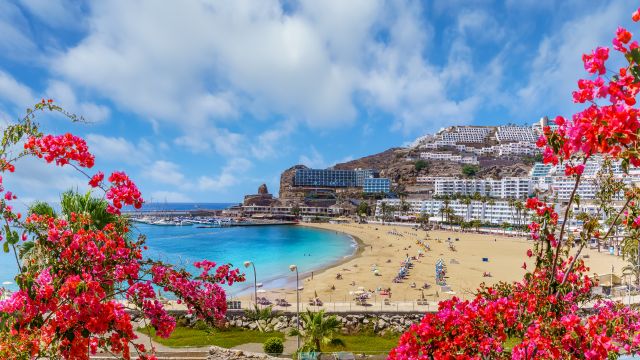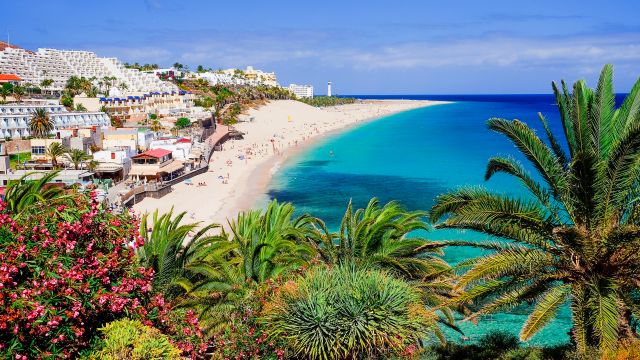What’s the climate like in the Canary Islands?
The current climate of the Canary Islands features average monthly temperatures ranging from highs of 29°C during the day to lows of 22°C. The average yearly temperature is around 26°C. At night, temperatures in the colder months average around 15°C and in the warmer months around 22°C.
The highest temperature recorded in the Canary Islands in recent years was 44°C in August 2021. The lowest daytime temperature recorded was 16°C in April 2019.
On average, the Canary Islands receives 300 mm of precipitation each year. For comparison, UK gets 701 mm of precipitation annually.
Curious about the climate in other parts of Spain? Check out the weather and climate in places like Gran Canaria, Lanzarote, Fuerteventura, or have a look at other destinations in Spain.
Best time to visit the Canary Islands?
The best time to go for a sun holiday to the Canary Islands is January through December. During this period, you'll have good temperatures and not too much rain, making it a great time to visit the Canary Islands.
Climate Table of the Canary Islands
The climate table of the Canary Islands shows the average temperatures, precipitation, and UV index per month. The table gives an overview of the average day and night temperatures in degrees Celsius, the total amount of precipitation in millimetres, the total snowfall in centimetres, and the UV index for each month. Precipitation is always measured as water, even if it's snow or hail.
Click on the month name to see more weather details, like daily averages, temperatures, and precipitation for the past years in that month.
- Average yearly temperature: 26°C
- Highest temperature: 29°C in August
- Lowest temperature: 22°C in January
- Precipitation: 300 mm per year, averaging 25 mm per month
- Driest months: 1,5 mm in July, 3,4 mm in June and 4,5 mm in September
- Wettest months: 57 mm in February, 50 mm in November and 46 mm in October
Average Temperature per Month in the Canary Islands
This graph shows the average maximum temperatures per month in the Canary Islands, Spain. The temperatures are shown in degrees Celsius and the average is calculated based on the recorded temperatures per month from past years.
Average Precipitation per Month in the Canary Islands
This graph shows how much precipitation the Canary Islands, Spain, gets on average per month. Precipitation is always measured as water, even if it's snow or hail. This makes it easy to compare how much has fallen, regardless of the form of precipitation. The amount of precipitation is measured in millimetres and the average is calculated based on the recorded precipitation per month from past years.
Average UV Index per Month in the Canary Islands
This graph shows the average UV index per month in the Canary Islands, Spain. The UV index indicates the intensity of ultraviolet radiation and ranges from 0 to a maximum of 11.
Yearly Temperature in the Canary Islands
This graph shows the average yearly temperature in the Canary Islands, Spain. The yearly temperature, expressed in degrees Celsius, is the average of all twelve monthly temperatures summed up for that year.
Total Yearly Precipitation in the Canary Islands
This chart shows the total yearly precipitation in the Canary Islands, Spain, over the past few years. The total yearly precipitation, measured in millimetres, is the sum of all the rain that fell in the twelve months of that year.
More Climate Info About the Canary Islands
The Canary Islands have a subtropical climate, meaning they are generally warm and sunny all year round. However, there can be considerable variations depending on which island you visit. For example, the islands of Tenerife, Lanzarote and Fuerteventura are generally warmer and drier than other islands, such as Gran Canaria or La Palma.
The average temperature on the Canary Islands ranges from 21-23 degrees Celsius. In the winter months, the average temperature drops to 18 degrees Celsius. However, it is still relatively warm compared to other countries in Europe.
The Canary Islands also have very little rainfall. The island of Fuerteventura is the driest of all the islands, with an average annual rainfall of just 150 mm. By comparison, the wettest island is La Gomera, which has an average annual rainfall of 1,200 mm.
Several factors influence the climate of the Canary Islands
The Canary Islands' climate is influenced by a number of factors, including the Gulf Stream and trade winds. The Gulf Stream is a warm ocean current that flows from the Gulf of Mexico to the Atlantic Ocean. This current helps keep the Canary Islands warm in winter and cool in summer. The trade winds are another important factor in the Canary Islands' climate. These winds blow from east to west and help bring clouds and rain to the islands.
Another factor affecting an island's climate is its topography. An island with mountains will have a cooler climate than one that is completely flat. This is because mountains block sunlight and prevent heat from reaching the surface of the island. Lanzarote, for example, has an average temperature of 20 degrees Celsius because it is flat. La Gomera, on the other hand, has an average temperature of 16 degrees Celsius because it is mountainous.
What is the warmest island in the Canary Islands?
The warmest island in the Canary Islands is Fuerteventura, but it is not much different from the other islands in the top three warmest Canary Islands. Fuerteventura has an average annual temperature of 22.7 degrees Celsius. The second warmest island is Lanzarote, with an average annual temperature of 22.4 degrees Celsius. The top three is rounded off by Tenerife, with an average annual temperature of 21.8 degrees Celsius.
Weather experiences in the Canary Islands
The weather in the Canary Islands is rated an average of 5 out of 5 stars by 2 visitors. Have you been to the Canary Islands? Share your weather experience to help other visitors.
Write your own review 
Have you been to the Canary Islands?
Share your weather experiences in the Canary Islands.
Average Weather in the Canary Islands by Month
Click on a month below to see detailed weather info for the Canary Islands. Based on historical weather data, you can see the average temperature, precipitation, wind, and UV index for each day of the month.












